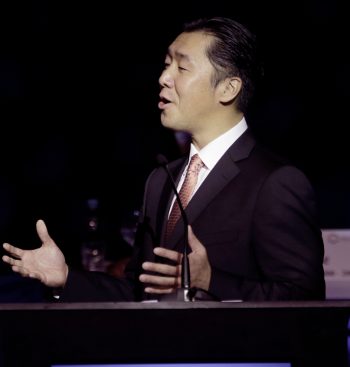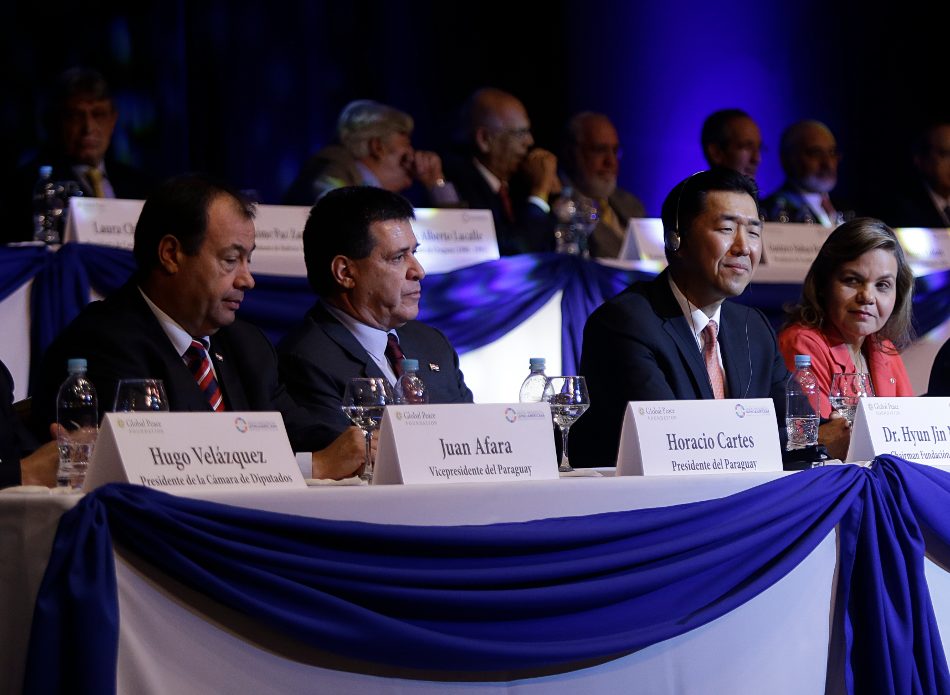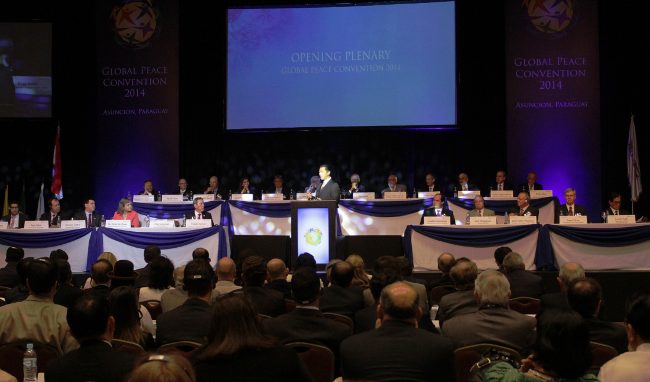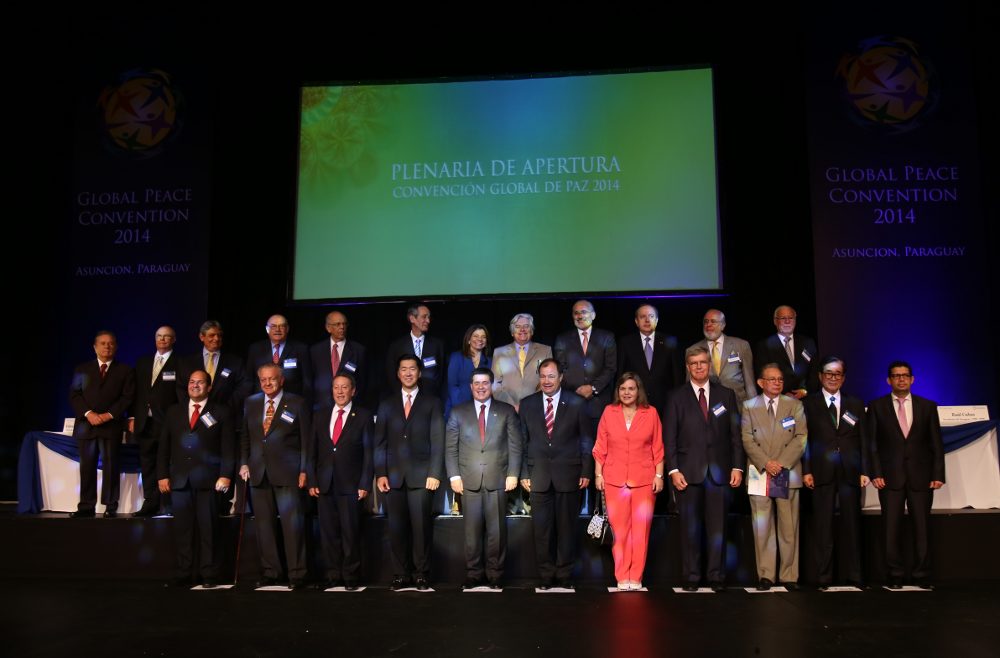The following is the full transcript of the speech delivered by Dr. Hyun Jin Moon, chairman of the Global Peace Foundation at its annual convention, held at the Bourbon Conmebol Assunção Convention Hotel.
“A Roadmap for National Transformation: Liberty, Prosperity and Integrity through Moral and Innovative Leadership”
Excellencies, distinguished guests, ladies and gentlemen:

Dr. Hun Jin Moon at the Global Peace Convention 2014, “Roadmap for National Transformation.”
It is my great honor to welcome you to the Sixth Annual Global Peace Convention here in Asuncion, Paraguay. This Convention is bringing together leaders from more than 40 nations, and all sectors of society, including politicians and government officials, religious and business leaders, educators and civil society leaders, united by a common vision for peace and prosperity, and ready to work together to achieve it.
I want to give special thanks to our host H.E. President Horacio Cartes for his warm welcome to Paraguay. Could we express our thanks to him?
And I would also like to recognize the Vice-president of Paraguay, Juan Afara who is with us here today. Could we please offer a round of applause?
To President Juan Carlos Wasmosy, President Vincio Cerezo, President Luis Alberto Lacalle and the members of the Latin American Presidential Mission here today, could they please stand to be recognized?
We owe much of the success of this convention and GPF’s work in Paraguay to Senator Lilian Samaniego of our Global Leadership Council. May we thank her?
And of course we also want to thank our distinguished local host, the Mayor of Asuncion, Arnaldo Samaniego, for bringing us to this beautiful green and vibrant city known as the “mother of cities.”
We would also like to appreciate the many significant faith leaders with us today, including:
- My good friends Bishop Manoel Ferreira and Congressman Nelson Marquezelli of Brazil;
- Dr. Marsudi Syuhud, Secretary General of Nahdlatul Ulama of Indonesia; and
- Dr. Robert and Donna Schuller from the United States.
And a special thanks to all of the distinguished GPF Global Leadership Council members in attendance from throughout the world.
We are drawn together here inspired by the vision of One Family under God, and the hope, that as we find more ways to act upon it, we can heal the divisions that separate humanity and make peace a global reality.

(Left to right) Vice President of Paraguay, H.E. Juan Afara, President of Paraguay, H.E. Horacio Cartes, Founder of Global Peace Foundation, Dr. Hyun Jin Moon, National Senator of Paraguay, Hon. Lilian Samaniego.
The theme of this year’s convention is “Roadmap for National Transformation: Liberty, Prosperity and Integrity through Moral and Innovative Leadership.” This theme focuses on the type of change within nations that is needed to move towards world peace. It is particularly fitting for a convention held in Paraguay, which is part of the “Global South,” the world of emerging nations seeking to grow and find their place in the global economy and the community of nations.
This theme focuses on the type of change within nations that is needed to move towards world peace. It is particularly fitting for a convention held in Paraguay, which is part of the “Global South,” the world of emerging nations seeking to grow and find their place in the global economy and the community of nations.
When the Cold War ended, so too did the old world order based on ideological division. A new world order has yet to be established, and emerging nations will play an increasingly important role in shaping how it looks, for better or worse. With the Cold War geopolitical order gone, the world has experienced increasing fragmentation along tribal, ethnic, sectarian, and religious lines.
This has produced violent identity-based conflicts across the developing world, — in the Middle East, Africa and Southeast Asia. Here in Latin America the legacy of Iberian feudalism still fuels social conflicts based on disparities of wealth and opportunity. The old struggle of communism and capitalism still endures at a social level in this region, producing opposing visions for the path to prosperity.
Many emerging nations today are experiencing significant economic growth and greater democratization. Yet they also face many challenges. In addition to the instability arising from identity-based conflict, there is inequitable development that fails to benefit the people as a whole, and government tainted by corruption. How these challenges are met will have great significance for global peace and prosperity. The nations of the southern hemisphere hold the key to the future.
In addition, most of the emerging world has large youth populations. This is in marked contrast to the developed world with its aging populations, low birthrates, and dissolving families. The energy of the young represents a great opportunity for the growing economies of the developing world.
Yet those energies need to be properly harnessed and that is the challenge. It calls for education both in productive skills and in moral and civic virtues. That, in turn, requires tackling poverty and its cultural impact. The negative behaviors that poverty produces undermine social stability and thus impede progress toward equitable and sustainable prosperity.
The energy of the young represents a great opportunity for the growing economies of the developing world. Yet those energies need to be properly harnessed and that is the challenge.
How to achieve prosperity without sacrificing traditional values is another major challenge for countries in the southern hemisphere. Observing the breakdown of families and its social impact in the so-called advanced nations, and in the wake of the global financial crisis of 2008, many countries are looking for alternatives to the Western development model. They are looking for new models of national transformation that can stimulate economic development and material prosperity without having to compromise spiritual and moral traditions or their roots in strong family values.
If these countries successfully meet their challenges they will create the foundation for a peaceful new world order. That is why it is vitally important to understand what it takes to bring about national transformation.
This region has a tremendous opportunity to bring about a rebirth of Latin America. It is particularly encouraging to see so many former heads of state gathered here for the 2nd Summit of the Latin American Presidential Mission. They are dedicated to applying their experience to lift up their region.
To achieve this, Latin American society has to become more inclusive. Positive social transformation leads to political and legal change that then leads to sustainable economic development. In the feudal system that Latin America adapted from Spanish and Portuguese colonizers, a serf had no ownership, few rights, and, as a result, little opportunity or incentive.

Fourteen heads of state, the current president of Paraguay at the Second Summit of the Latin American Presidential Mission.
This was in contrast to the cultural traditions of North America that grew out of the English common law and encouraged independence, enterprise, and self-reliance among an ever-growing segment of society.
These differences grew out of fundamental principles and values that upheld human rights and freedoms and sought to extend them to all people. Basic liberties created social opportunity. Hard work was rewarded, enterprise encouraged, and an engaged citizenry expanded. Prosperity was the fruit of the resulting culture.
For much of its history Latin America has had oligarchic societies that excluded the majority of the population from prosperity, and political influence and engagement. Lacking these opportunities, opposition often took radical forms. Today, social disparity remains a challenge that the region has to meet.
To prosper, Latin America needs a broad, well-established middle class, engaged in the economic and political life of their countries. That requires good education and opportunity for all citizens. As these social issues are addressed, the political and legal framework can change, creating greater stability through the rule of law and the protection of property rights. At the root of these changes are the principles and values that uphold the rights and freedoms of every citizen and lead to the creation of a society where they can be exercised.
This opens the door to economic development and prosperity, particularly as it makes a country attractive for foreign investment. A country that leads the way in this process can become a hub nation for its region and a model for the world.
Peace and prosperity cannot be secured in this world without nations that exemplify integrity, good governance, and responsibility. Our host nation, Paraguay offers an instructive example of how national transformation can begin.
Peace and prosperity cannot be secured in this world without nations that exemplify integrity, good governance, and responsibility.
Since my first visit here in 2008, Paraguay has made great strides forward. Back then, the U.S. State Department was advising Americans not to travel to the country because of security concerns. Also, the Paraguayan government was planning to expropriate foreign owned private property. Yet at the same time, Paraguay’s leaders wanted the country to develop and become part of the global economy.
Paraguay could never prosper as part of the global economy if it did not respect the rule of law, and property rights as part of that rule. No foreign government or organization would invest in a country where their enterprise was not protected by the law. The president and other leaders at the time whom I spoke with, understood the force of this argument. They made a historic choice that set Paraguay on a path to becoming a well-functioning democracy.
Where might this path lead? My experience here convinces me of Paraguay’s great potential. With the right foundation of principles and values, Paraguay can become a prosperous and peaceful modern democracy that respects the rights and freedoms of its people, and promotes a successful free market economy that unleashes their creativity.
Such a transformed Paraguay, at the center of South America, can be like a womb for the rebirth of the region from which a genuine prosperity, and the principles and values that underpin it, can spread throughout Latin America, and across the developing world. I have shared this vision consistently with the leaders of Paraguay in government, business and civil society.

Over one thousand representatives of 40 countries around the world at the Global Peace Convention 2014.
In the past six years much has changed in this country as efforts have grown to move from vision to social transformation. I am proud to say that the Global Peace Foundation has been among those at the forefront of that endeavor. In 2010 we established IDPPS, a research institute, to develop a roadmap for the future of the nation. Its members are prominent and respected figures known for their integrity. They come from the ranks of government, business, the Central Bank, Supreme Court, and the military.
That same year GPF and the Institute held a conference in Asuncion for Paraguayan leaders from both the public and private sectors that attracted several former heads of state from the greater Latin American region. Their presence became the seed of the Latin American Presidential Mission, established at the Global Peace Convention in Atlanta in 2012.
The conference produced the “Asuncion Declaration,” a comprehensive statement of principles that affirmed the desire of Latin American leaders “to work beyond religious, political, social, and ethnic differences for the unity of Latin America.” That affirmation was reiterated by several of the former presidents the following year in the “Brasilia Declaration.”
The Declaration outlined the need to “revive the civic values and virtues that reflect the better spiritual, democratic, and plural traditions of humanity in this continent,” and to “promote education in ethical principles and universal values that can empower children and young adults to become better human beings and good citizens.”
These principles are being implemented through the work of the Institute and GPF’s national chapter here in Paraguay and by the Latin American Presidential Mission across the wider region.
The Institute has contributed to the creation of sound and consistent public policy based on mobilizing public and private partnerships, particularly through its work on a development model for the vast, poverty-stricken Chaco region. Meanwhile, GPF has been promoting greater social stability in the country through forums on the core principles essential for good governance and a wide range of social initiatives.
These include character education in the nation’s schools, launched in cooperation with the Ministry of Education; youth volunteerism; and an energetic and enterprising women’s division that does pioneering work to advance the role and dignity of women and affirm the fundamental importance of the family in transmitting values.
The Latin American Presidential Mission is working throughout the region to strengthen relations between North, Central and South America and the Caribbean as well as promoting a hemispheric spiritual awakening centered on the universal principles and values that uphold vibrant, well-functioning democracies. It is also promoting broad educational initiatives focused on moral and civic development and contributing ideas on issues such as trade and investment, income disparity, and how to combat organized crime.
In Alto Paraguay, GPF has been active since 2009 in the main town of Puerto Casado, providing basic assistance in health, education, and housing. Later GPF established sustainable projects including a fish farm, communal vegetable farm, and bakery to help the community support itself.. Last year, Marlene Ocampos, who had guided these projects as GPF social director in the state, ran for governor of Alto Paraguay.
Against expectations, and on the strength of her work for the people of the state, she won the election. As governor, she has continued to lead with the same spirit of service. The Institute has supported her work with its expertise, establishing efficient and transparent systems of government that help to root out corruption.
The example of Alto Paraguay is causing a stir in Paraguay today. There are entrenched special interests that are threatened by the changes underway there. But those with a greater vision see in it a model for other states to imitate. During my last visit here one governor asked me for GPF’s help to implement in his state what had been done in Alto Paraguay.
As fundamental principles are put into practice through political and social initiatives, the stability of the country grows, making it more attractive to international investors. Investment will allow Paraguay to build its infrastructure and become a hub nation for all of Latin America.
I foresee a future in which Paraguay becomes for Latin America what Singapore is for Southeast Asia or Dubai for the Middle East.
As the Latin American region experiences a rebirth it will naturally look west to build trade relations with Asian countries, as part of the emerging Asia-Pacific era. Even though Paraguay is a landlocked nation, it needs to be part of this process to become fully engaged in the global economy.
In this regard, I believe that Korea and Paraguay make natural partners, complementing one another. Korea is technologically advanced but resource poor. It also needs new markets. Paraguay is resource rich but can benefit from Korea’s experience of development to advance its own economy.
I foresee a future in which Paraguay becomes for Latin America what Singapore is for Southeast Asia or Dubai for the Middle East.
Last June I helped bring a group of infrastructure experts and bankers from Korea to meet Paraguayan officials and discuss development plans. A start has already been made. Korea’s Il Sung Construction company started work on a road project here last June. Hyundai has already established a factory here creating needed jobs while KOICA, Korea’s overseas development agency, has been active with feasibility studies for infrastructure projects.
I have spoken with some detail about what has been taking place in Paraguay. The reason is that Paraguay offers a model of how national transformation can come about. It shows the foundational importance of principles and values, and their translation into initiatives that promote social transformation, leading to greater political and social stability. This in turn opens the door for sustainable economic development. As a result it has global implications.

Fourteen former presidents, joined by the current president and vice-president of Paraguay, members of the think-tank IDPPS and the Global Peace Foundation.
If nations and regions are transformed in this way, the future peace of the world will be assured. The principles and values at the heart of this model uphold human rights and freedoms; encourage the enterprise and creativity that produce prosperity and a sense of worth; and promote the ideal of working for the greater good.
The Global Peace Foundation, in cooperation with partners such as yourselves, is working in fifteen nations across the world to lay the foundations for national and regional transformation. Interfaith leadership is crucial for resolving sectarian conflict and establishing a consensus of values. I want to recognize the work in Nigeria where Christian and Muslim leaders are working together in states like Kaduna to resolve sectarian tensions. They have launched a “One Family under God” grassroots movement to bring their Christian and Muslim followers together in peace.
The idea that all people are members of One Family under God lies at the heart of the principles and values of which I speak. This simple yet profound vision transcends every ethnic and sectarian divide. As such, it has the power to lift us from national transformation to regional transformation, upward to achieve global transformation and a peaceful world.
The idea that all people are members of One Family under God lies at the heart of the principles and values of which I speak. This simple yet profound vision transcends every ethnic and sectarian divide. As such, it has the power to lift us from national transformation to regional transformation, upward to achieve global transformation and a peaceful world.
The power of the vision to connect regions in innovative ways was demonstrated recently when a group of Nigerian religious leaders traveled to Northern Ireland to share their experiences with community leaders in Belfast working to bridge the Catholic-Protestant divide.
I also want to acknowledge the important work of our partner in Indonesia, Nadhlatul Ulama, a major Muslim civic organization working tirelessly to refute extremist distortions of Islam, and to promote tolerance among all people.
In Korea, my recently published book, “The Korean Dream,” articulates a vision for a united Korea based on the principles and values that have guided Korean history for millennia. It lays out a model for people to act on those principles through civic associations to unite their country. This appeal to root principles and values is paralleled here in the Americas by the call for a Great Hemispheric Awakening to revive the spiritual foundations of the nations of North and South America.
Our world today is gravely threatened by identity-based conflicts, driven by the divisions I have mentioned. Violence and chaos reign in many parts of the world. It is our responsibility, through initiatives such as these, to show that a brighter alternative is possible. The vision of One Family under God can be the antidote to such identity-based conflicts, if we are determined to make it a reality through our commitment and creativity.
That is why models of national transformation are needed throughout the world. I trust you will become owners of this vision; that you will be the moral and innovative leaders who will implement it, bringing social transformation to your communities, societies, and nations.
I urge you to join with me and with one another to rise above the barriers that have separated us throughout history and secure for future generations a world of peace and prosperity for all.
Thank you and may God bless you and your families.
